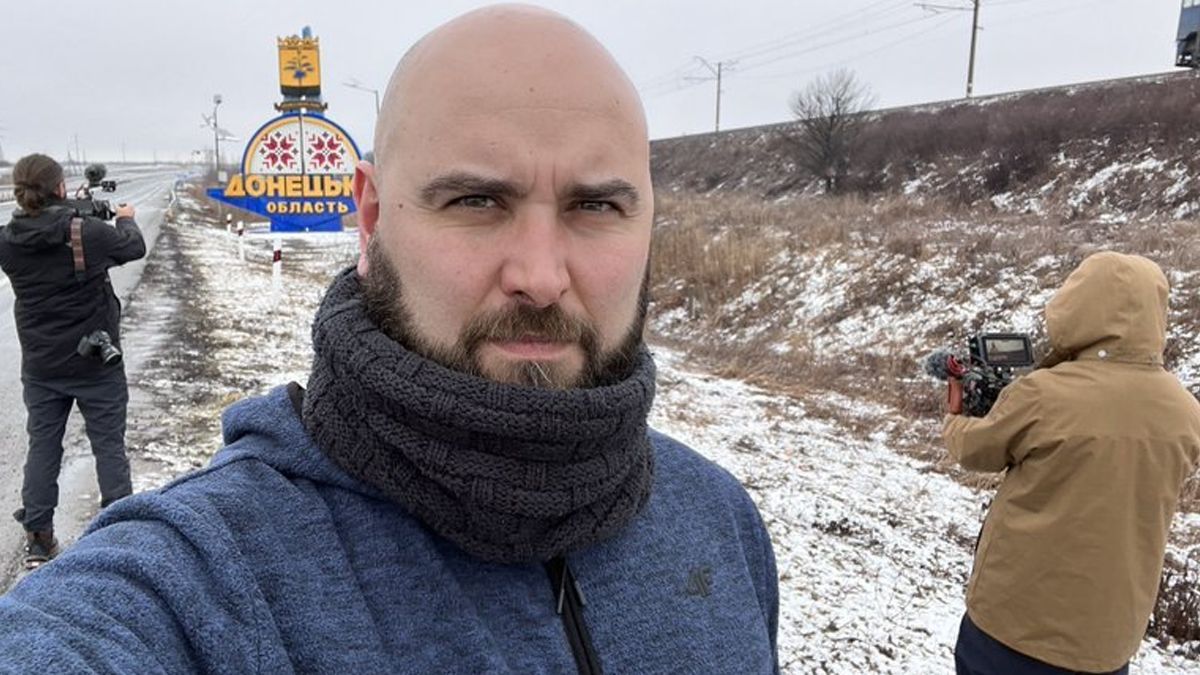The IPI global network today urged authorities in Poland to immediately secure the release of Spanish freelance journalist Pablo González and to provide more details on the reason for his arrest.
González, a Basque journalist specializing in post-Soviet countries who has been covering the war in Ukraine and the resulting humanitarian crisis from close to the border, was arrested by the Polish Security Services at some point overnight on February 27, according to media reports.
Since the war broke out, he had been reporting from the Polish city of Rzeszow as part of his work as a contributor to multiple Spanish news outlets including Público, LaSexta and the Basque publication Gara.
On February 28, his lawyer Gonzalo Boye confirmed on Twitter that his client had been detained. He later confirmed authorities had justified the arrest because González had “carried out actions against the Polish State”. Earlier in February, González was interrogated by Ukrainian security forces, accused of being “pro-Russian” because of his work with Gara and asked to leave the country.
“The arrest of Pablo González by Polish authorities is profoundly concerning”, IPI Deputy Director Scott Griffen said. “We call on authorities in Poland to immediately release González and to officially clarify the reason for his detention. Poland must allow all journalists to operate freely on the border with Ukraine.”
#Poland: IPI urges @PolandMFA to immediately secure release of #Spanish freelance journalist @PabVis, who was detained in #Rzeszow near #Ukraine border, where he has been reporting for @publico_es on arrival of refugees. Authorities must provide reasons for his arrest. @boye_g pic.twitter.com/EWQnqUuzvi
— IPI-The Global Network for Independent Journalism (@globalfreemedia) February 28, 2022
“My client, the Spanish journalist Pablo González, has been arrested in Poland for doing his job”, his lawyer said on Monday. “We demand that his physical integrity and his immediate release be guaranteed. Without freedom of the press, there is no democracy”.
According to Público, the journalist contacted them for the last time on Sunday night when he filed an article about people arriving from Ukraine to escape the war. During that conversation, González had said that he was retiring for the night to rest. He was last active on Twitter at 12.13am.
The journalist, who was born in Moscow, has long studied the post-Soviet space and is currently pursuing a doctorate at the University of the Basque Country. He participates in the GeopolitikaZ IT/GI podcast, in which he analyzes international politics in Eastern Europe. Before the war broke out, he travelled to Ukraine to report on rising regional tensions.
The journalist was previously arrested in Ukraine on February 6 while reporting from Donbas for various Spanish media. He was contacted by Ukrainian security services and requested to come to Kyiv to be questioned. After travelling to the capital, González was interrogated for several hours and accused of being “pro-Russian”, according to Spanish reports.
According to those reports, his work with the left-wing Basque newspaper Gara, the successor to the leftist and Basque nationalist newspaper Egin, was cited as the reason for the suspicions. His command of the Russian language and a credit card from Caja Laboral, a Basque credit union, were also cited as reasons for his alleged “pro-Russian” views.
After questioning, González said he was “invited” to leave the country by the security services, though no formal expulsion order was issued by Ukrainian authorities. During this time, he raised his case with the Spanish embassy in Kyiv and contacted the consul general. Público carried out negotiations on his behalf with the Ministry of Foreign Affairs.
At the same time, several members of his family and friends in Spain were approached by officers from the National Intelligence Center (CNI), Spain’s main intelligence service, who questioned them about his alleged links with Russia. According to Público, some of the agents described Gara as “a pro-ETA media outlet subsidized by Russia”. They also accused the journalist of “passing information to Russia”.
As the invasion of Ukraine began on February 25, González left the country and travelled to Warsaw, from where he headed back to near the border with Ukraine to cover the escalating humanitarian crisis.
Since the arret, his lawyer said he had not been able to communicate directly with his client, who remains in detention. Boye told media he had been informed by Polish authorities that the arrest is linked to the previous interrogation in Ukraine. It is understood the arrest came after a follow-up request from the Ukrainian intelligence services.
The Basque Association of Journalists, Kazetariak, issued a statement demanding his immediate release. Multiple Spanish politicians also called on Polish authorities to release the journalist. Spanish authorities have confirmed they are seeking clarifications about the reasons for the arrest.
This statement by IPI is part of the Media Freedom Rapid Response (MFRR), a Europe-wide mechanism which tracks, monitors and responds to violations of press and media freedom in EU Member States and Candidate Countries.

